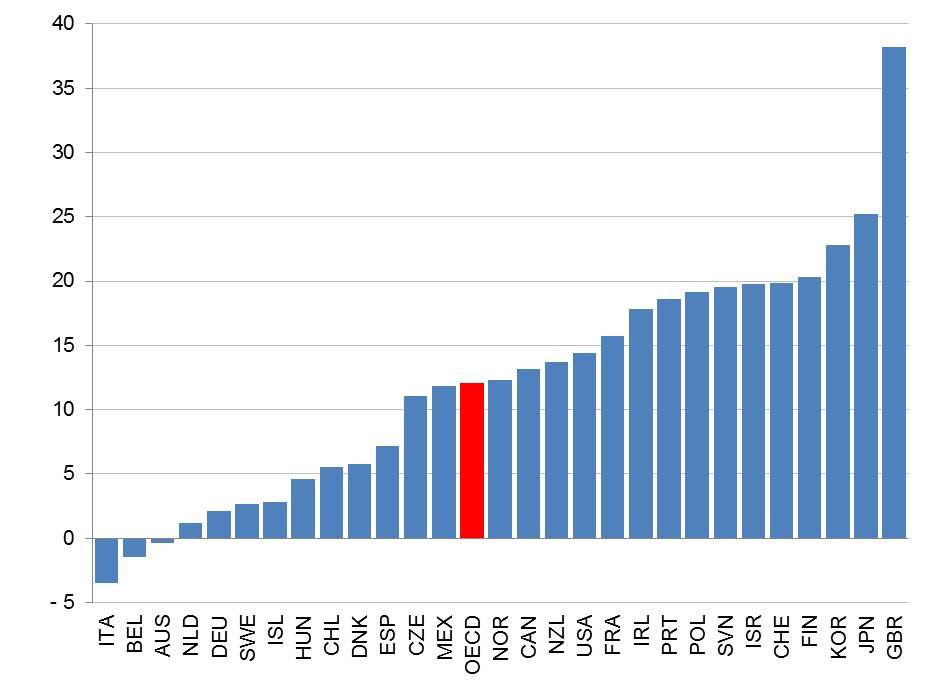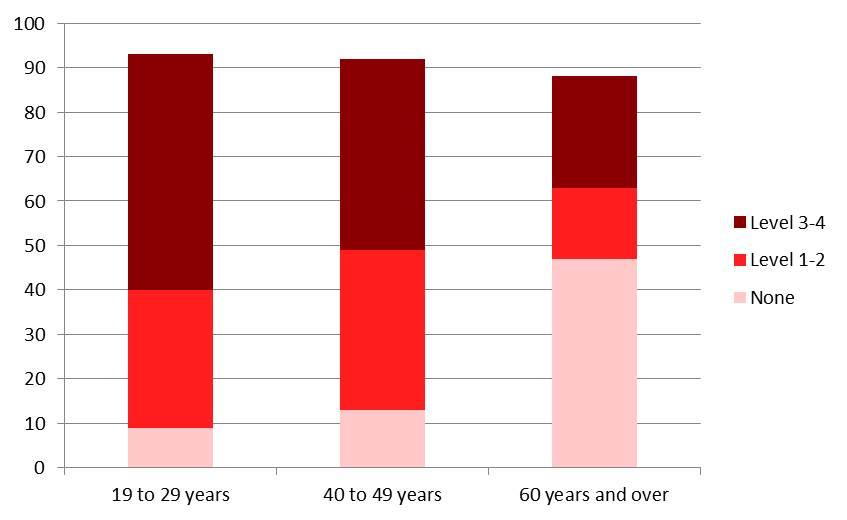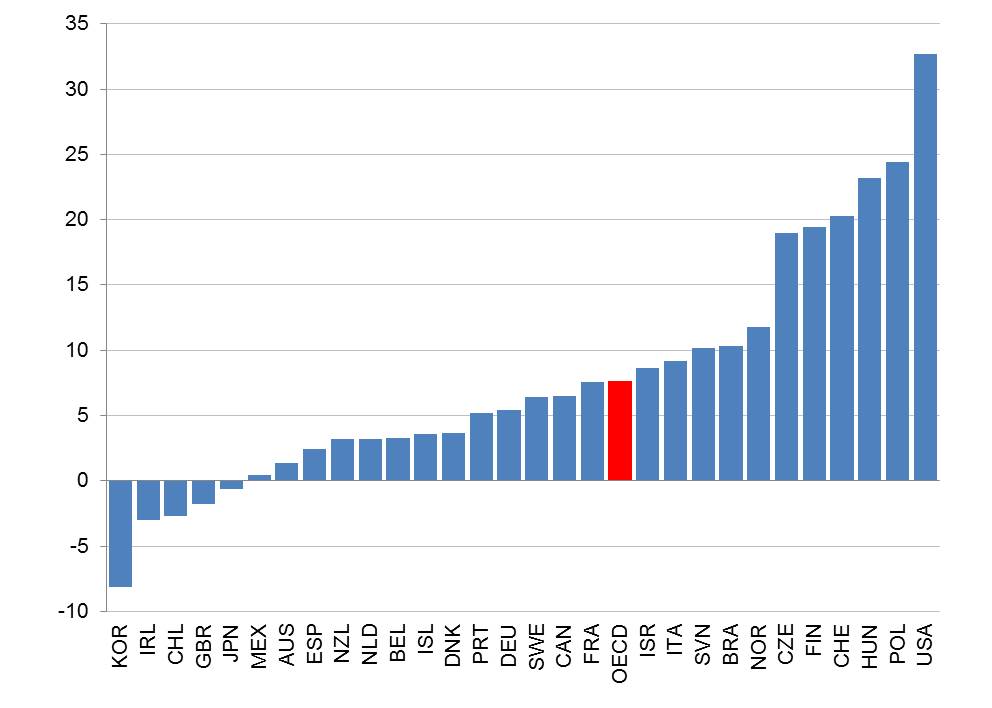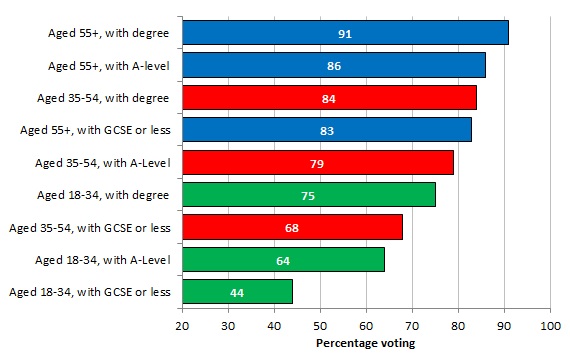Highly educated young people are less likely to vote than older people with much lower levels of attainment
Older people are more likely to vote and highly educated people are more likely to vote: these are electoral phenomena common in advanced democracies across the world. The UK stands out from its counterparts in some ways: we have a much wider gap in turnout between young and old, while the gap in turnout based on education is either much smaller or non-existent. Richard Berry and Anthony Mcdonnell investigate these trends, highlighting findings from the 2011 census, British Election Study and OECD data on voting patterns.

Britain’s youth: they may be highly educated, but are they also highly apathetic? Credit: David Morris (CC BY-SA 2.0)
The low levels of electoral participation by young people – as discussed by Izzy Westbury recently on Democratic Audit – is a growing concern for UK democracy. According to OECD data, based on post-election surveys, the gap in turnout between older and younger voters is significantly higher in the UK than in any other advanced democracy – at 38 percentage points. See Figure One below.
Figure One: Difference in voting rates between those 55+ years old and those 16-35 years old (percentage points), most recent general election
 Source: Society at a Glance 2011, OECD, 2011
Source: Society at a Glance 2011, OECD, 2011
The UK findings are supported by the British Election Study, based on pre- and post-election surveys with voters and non-voters. Table One shows turnout at the 2010 general election.
Table One: Turnout by age group, 2010 UK general election
| Age group | Turnout |
| 18-25 | 62% |
| 26-35 | 68% |
| 36-45 | 75% |
| 46-55 | 82% |
| 56-65 | 82% |
| 65+ | 89% |
Source: British Election Study, 2010
It might be reasonable to expect the opposite relationship between age and turnout. Electoral participation is strongly correlated with education in most countries – the higher your level of educational attainment, the more likely you are to vote. And in the UK, younger people are more likely to be highly educated, as shown by Census data.
Figure Two: Highest level of educational attainment by selected age groups, England and Wales (%)
 Source: Census 2011, Office for National Statistics. Other qualifications and apprenticeships are excluded. Levels 1-2 = GCSE; Levels 3-4 = A-Level/Degree
Source: Census 2011, Office for National Statistics. Other qualifications and apprenticeships are excluded. Levels 1-2 = GCSE; Levels 3-4 = A-Level/Degree
According to the OECD, however, Britain is one of only a handful of advanced democracies where those with degree-level education are less likely to vote than those with only a secondary education (by 1.8 percentage points). See Figure Three for the full comparison.
Figure Three: Difference in voting rates between ‘high’ and ‘low’ educated people (percentage points)
 Source: Society at a Glance 2011, OECD, 2011. ‘High’ indicates university education; ‘low’ indicates secondary education or lower.
Source: Society at a Glance 2011, OECD, 2011. ‘High’ indicates university education; ‘low’ indicates secondary education or lower.
The British Election Study results are less clear-cut on the education effect in the UK, although they also support the view that education has less impact on voting than age does. See Table Two.
Table Two: Turnout by highest level of educational attainment, 2010 UK general election
| Highest level of attainment | Turnout |
| Lower than GCSE or equivalent | 68% |
| GCSE or equivalent | 75% |
| A-Level or equivalent | 74% |
| Degree | 81% |
Source: British Election Study, 2010
When we cross-tabulate the age and education results from the British Election Study, the analysis reveals that within age group, more highly educated people are more likely to vote. However, young people of any educational background are less likely to vote than older people. For instance, while 75% of 18-34 year olds with a degree voted in 2010, this was less than the 83% of over 55s with a secondary education or less who voted. See Figure Four.
Figure Four: Turnout in 2010 UK general election by age group and highest level of educational attainment
Source: Democratic Audit analysis of British Election Study, 2010. Includes equivalent qualifications.
Knee-jerk reactions to low turnout among young people need to be avoided. Some may look at the figures presented above and conclude that Australia’s system of compulsory voting is the answer – after all, the country has 95% turnout and no gap between young and old. However, it is possible this solution only masks the problem, rather than solving it. It may even backfire – compulsion would increase turnout, certainly, but what impression would it leave in the mind of a young person, and how would it affect the way they participate between elections?
We need to remember that low turnout among young people is not just a ‘young people problem’. It is also evidence of wider problems within our political system, which would discourage a person of any age from voting. But there may well be reforms that can be tailored particularly for young people that help support their participation: for instance, better provision of online election information, which may suit people that are highly mobile in geographical terms, and accustomed to using the internet in many aspects of their lives.
Britain’s older generations have clearly picked up the voting habit at a time when political, economic, even technological circumstances were very different. We have some searching questions to answer before we can expect young people to do the same in large numbers.
—
The authors are grateful to Professor Jane Green of the University of Manchester for her support in the analysis of British Election Study data. OECD data is derived from: International Institute for Democracy and Electoral Assistance (International IDEA), Module 2 and 3 of the Comparative Study of Electoral Systems (CSES)
Note: This post represents the views of the author, not those of Democratic Audit or the LSE. Please read our comments policy before commenting. Shortlink for this post: buff.ly/1gq1z5f
—
 Richard Berry is a researcher and managing editor for Democratic Audit. His background is in public policy and political research, particularly in relation to local government. In previous roles he has worked for the London Assembly, JMC Partners and Ann Coffey MP. He tweets at @richard3berry.
Richard Berry is a researcher and managing editor for Democratic Audit. His background is in public policy and political research, particularly in relation to local government. In previous roles he has worked for the London Assembly, JMC Partners and Ann Coffey MP. He tweets at @richard3berry.
 Anthony Mcdonnell is Assistant Editor on the LSE Review of Books. Anthony joined the LSE Public Policy Group in February 2013 and has been working on the Review of Books since November. Anthony is a graduate of history and political science from Trinity College Dublin, currently doing a Master’s in public and economic policy at the LSE. Previously Anthony spent a year working in Malawi.
Anthony Mcdonnell is Assistant Editor on the LSE Review of Books. Anthony joined the LSE Public Policy Group in February 2013 and has been working on the Review of Books since November. Anthony is a graduate of history and political science from Trinity College Dublin, currently doing a Master’s in public and economic policy at the LSE. Previously Anthony spent a year working in Malawi.






 Democratic Audit's core funding is provided by the Joseph Rowntree Charitable Trust. Additional funding is provided by the London School of Economics.
Democratic Audit's core funding is provided by the Joseph Rowntree Charitable Trust. Additional funding is provided by the London School of Economics.
marketing consultant sydney
go here for greatest seo specialist sydney around
https://petsopedia.com/pet-health
see here for best puppy obedience training anywhere
business insurance broker
https://fast-high-risk-insurance-co.webnode.com/online auto insurance quote
buying
click here for the greatest overland park available
desarrollo web
go here for greatest experto en seo anywhere
cycling clothing for sale
This businessmen active in the enterprise associated with baby fashion will also be acquiring it all very difficult so you can get good quality clothing located at small will cost you. There are lots of ınternet sites the fact that at this moment deliv…
seo posicionamiento
go here for top quality posicionamiento seo anywhere
http://www.businessinsurance.theclevergroup.com/
https://profiles.wordpress.org/highriskautoinsurance/car insurance
life insurance
go here for best no exam life insurance available
posicionamiento web seo
get best seo madrid around
petsopedia.com
click here for greatest animal rescue anywhere
home insurance quote
https://cohere.open.ac.uk/user.php?userid=2310514390532240001394518820#conn-listbusiness health insurance
instagram likes
You my good friend are a genius
it companies in sydney
get greatest seo available
posicionamiento web
click here for top quality agencias de marketing around
Where To Buy Gamma Blue 11s
https://authenticoreo5s.liveblog.com Oreo 5s
Replica Oakleys
Heya! I’m at work surfing around your blog from my new iphone 4! Just wanted to say I love reading your blog and look forward to all your posts! Keep up the fantastic work!
https://petsopedia.com/food-and-diet/
click here for best cat healthproblems anywhere
home insurance company
I have a limited account and an administrator account on Windows XP. I would like to import all of my Firefox settings from my Limited Account to my Admin Account so they are exactly the same..
https://theclevergroup.com
click here for top quality supplemental life insurance anywhere
treating arthritis in dogs
get greatest dog arthritis medication around
business property for rent
How do you make firefox use your existing installation of Flash?
my dog has arthritis
get best dogs arthritis anywhere
petsopedia.com/pet-lifestyles
get greatest free pets adoption available
home for sale website
I have a printer hooked up to the computer in my room. My daughter has a computer in her room and no printer. How can she do her homework on her computer, but have it print out on the printer in my room? Do I need the internet on one computer or both?…
best seo company
get greatest grow traffic work available
https://sydneyseod.com/
get greatest small business seo around
que significa seo
The top quality marketing online madrid around
servicios de seo
see here for best posicionamiento web en google anywhere
http://www.lifeinsurance.theclevergroup.com/
What blogging website had the least invasive ads for free-account users?
no medical life insurance
I just discovered using Joomla for dynamic website design but feel the limitation on use of templates is a major minus. I think it should be possible to use my own template in the design. Anyone help?.
theclevergroup.com
see here for greatest senior life insurance company around
petsopedia.com
The best organic pet products available
https://sydneyseod.com/
The top quality australia seo around
ford incentives
get the top transit connect available
variable life insurance
see here for best term life insurance available
ford dealer
see here for the top used trucks available
marketing companies
The top quality development work available
https://serviciosdeseo.net/busqueda-semantica/
The greatest posicionar web available
https://eloboostlol.livejournal.com
How do I start a website? I know that I have to buy a domain or something like that?
payday loan uk-electricity.co.uk
How to stop Firefox download window from popping up in Mac?
https://rulettszabalyokonline.blogspot.com
How do I make firefox show at the top of my start list?
used ford
see here for the best Milwaukee ford anywhere
liability insurance for business
If you say admit to crimes (real or not real) on blog posts, can you be reported to the police and be tried on what is written online?. What if the crime was just a lie, and its a supposed crime you did in another country?.
business insurance broker
Can i protect my blog content copyright without registering it to copyright departmen? please help?
https://sydneyseod.com/ppc/
go here for greatest sydney.net available
servicio de posicionamiento
see here for greatest la seo anywhere
https://pierswardle.com
How do you protect your website’s content from copyright infringement?
posicionamiento buscadores
click here for best posicionamiento web en buscadores around
https://www.youtube.com
get the greatest hybrid Hyundai available
ford dealer
get the top ford fusion hybrid available
https://petsopedia.com/pet-training/
see here for greatest Cats anywhere
iphone 4 unlock
I use a micro SD card between my laptop and netbook as an external hardrive for my class files. I often download files on one computer or the other without the drive in that computer. Is it possible to set my computer up so that when I insert my drive…
https://carinsurance.theclevergroup.com/
Is it possible to have CPAlead widget in a Joomla site?
boiler service cost
How do I copyright articles that I have written for free?
https://petsopedia.com/pet-health
see here for greatest dog friendly beaches around
terry robe
Is it true that blogs are just forum discussions with rss that would enable the user to watch what they wanted to watch more convieniently? Is that all the differences?.
petsopedia.com/pet-training/
click here for best dog stories anywhere
2014 ford e-series
go here for the top trucks ohio around
petsopedia.com/
click here for top quality incredible dog stories anywhere
hop over to these guys
How do I change the background on my blogger/blogspot to what I want?
chaussure foot
I am curious to find out what blog system you are working with? I’m having some small security issues with my latest blog and I would like to find something more safeguarded. Do you have any solutions?|
… [Trackback]
[…] Read More Infos here: democraticaudit.com/?p=2752 […]
… [Trackback]
[…] Read More here: democraticaudit.com/?p=2752 […]
A Committee of MPs at the House of Commons is currently inquiring into voter engagement, including the issue of low turnout and registration among young people. Please contribute by sending us your views – you can find out how on our website http://www.parliament.uk/voter-engagement-in-the-uk/
It would be interesting to look into the correlation between type of tenure with age and voting behaviour, as well as education. There’s a rise in the number of people renting privately in the 16-35 age group, and private tenants tend to be hardest to reach, not bother to register on electoral roll because they move so much, etc.
New DA analysis shows educated young people are less likely to vote than older people with lower attainment levels https://t.co/JFRqVNDKOh
Age gap bigger than education gap for turnout in Britain. https://t.co/KKE26pnPDf
RT @thom_brooks: Turnout in 2010 UK Election by age group & highest level of educational attainment-handy table https://t.co/zrWGq2H0kV http…
worrying? interesting? challenging? @democraticaudit demographic data on 2010 voting according to age and education https://t.co/udZ3Ajc8FF
Turnout in 2010 UK Election by age group & highest level of educational attainment-handy table https://t.co/xbFd40A1gL https://t.co/2ltZUYlYKa
“Britain’s older generations have clearly picked up the voting habit at a time when political, economic, even technological circumstances were very different. We have some searching questions to answer before we can expect young people to do the same in large numbers.”
But did the older generations “pick up the habit” when we had a two party system (which despite everything had representation across most parts of the country) and the current level of disillusion had not set in?
For the current generation we have seen the country become more polarised (North/South, Labour/Conservative, Urban/Rural, Rich/Poor, etc.)
The current (electoral and party) system no longer serves us and gives non-responsive results, so does “picking up the voting habit” serve much of a purpose?
Just making voting easier/sexier/techier will not change things – it will still fail the “why bother” test. Is it patronising to expect people to just change their behaviour because they can vote “by mobile”?
Radical idea: rather than playing with how people vote, why not make the vast majority of everyone’s vote actually matter?
Two great posts today on DA on Health and Wellbeing Boards https://t.co/rC5oJRFJ9y & electoral turnout https://t.co/Q0Q7en2RMG
Highly educated young people in the UK are less likely to vote than older people with much lower levels of attainment https://t.co/S1z2wEUNkE
@PJDunleavy: Highly educated UK young overrated as unable grasp link eg. housing shortage and party politics https://t.co/lr357UMKNR
Highly educated young people are less likely to vote than older people with much lower levels of attainment https://t.co/yD1tPCpsO7
UK citizens with higher educational attainment are less likely to vote. Why??? https://t.co/Stxo34FGxL